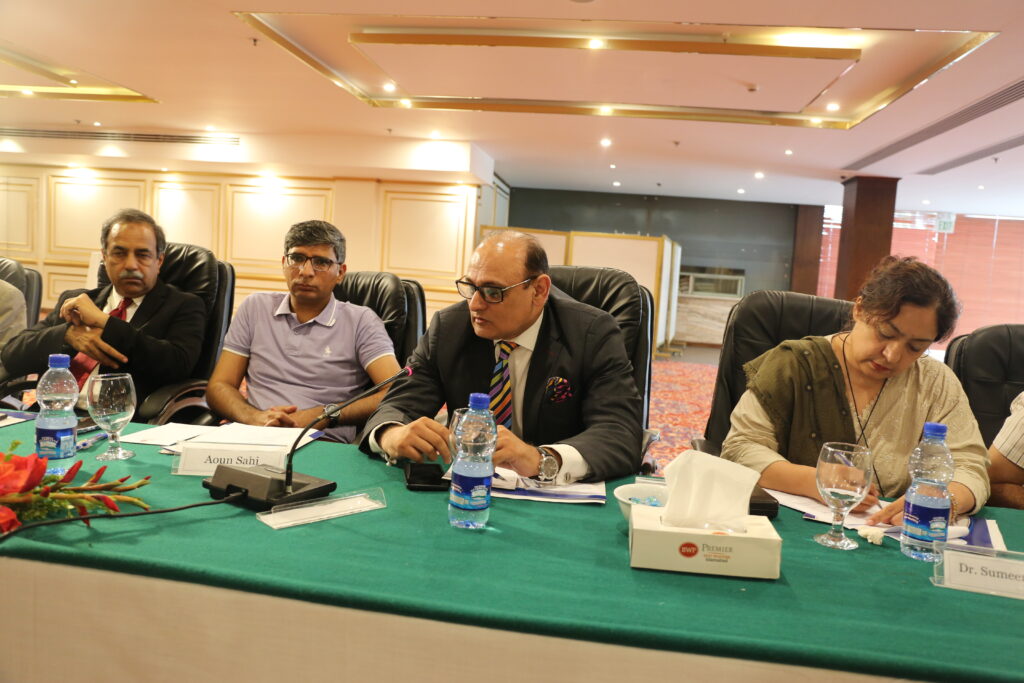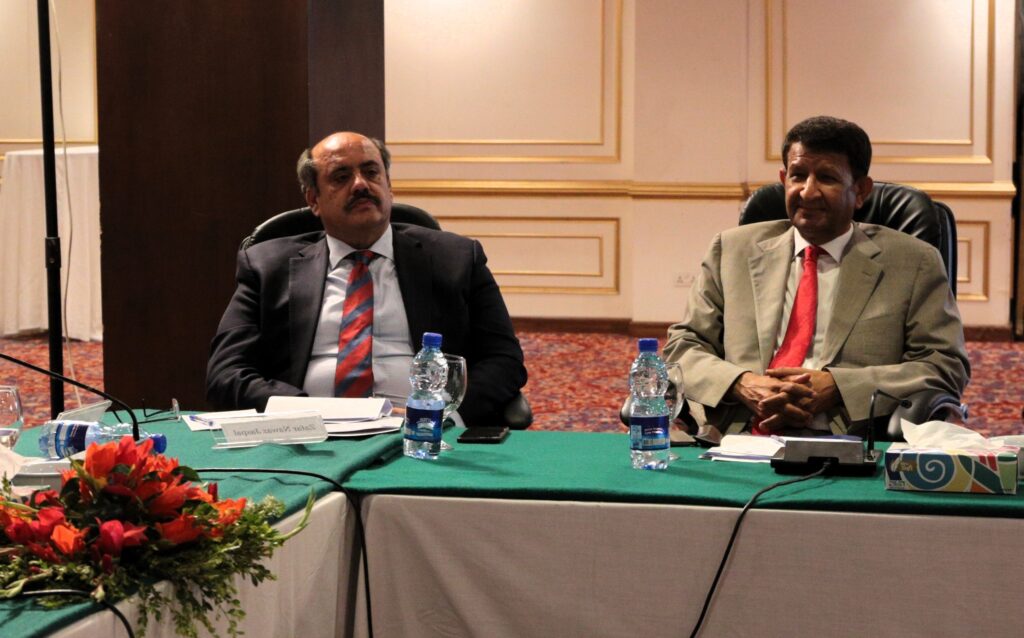Navigating Challenging Times: US-China Relations and Pakistan
Pak Institute for Peace Studies (PIPS) organized a seminar on ‘Navigating challenging times: US-China relations and Pakistan’ on July 19, 2023, in Islamabad. The event brought together lawmakers, diplomats, retired military officers, academics, and experts on regional trade and international relations.
Speakers at the seminar said that Pakistan should not miss a huge opportunity arising out of the China-Pakistan Economic Corridor (CPEC) despite the fact that the country’s ruling elite had strong social and economic links with the West – a reason that hampered progress on the multi-billion-dollar programme in the past. They said that the CPEC project had the potential to trigger modernization in agriculture and industrial sectors of Pakistan, but this did not happen because those at the helm of affairs resisted the much-needed transformation.
The sub-themes of the dialogue included ‘challenges and opportunities for Pakistan in navigating the complexities of the US-China relations’, and ‘the role of diplomacy in shaping US-China-Pakistan relations.’ The participants also discussed potential areas of cooperation and collaboration between the US, China, and Pakistan to address challenges and promote mutual understanding.
Chairman Senate Standing Committee on Defence, Senator Mushahid Hussain Syed, speaking on the occasion as a chief guest said that the future lied in regional economic connectivity and Pakistan had tremendous opportunities in it. “It is all about geo-economics… and we have to open up the borders… and avoid a new cold war,” he said.
Senator Mushahid, who is also chairman of the Pakistan-China Institute, suggested that Pakistan needed a new charter of foreign policy on national security. “The national security has to be redefined not in terms of military might but with regard to human security, climate change, energy, food security, water scarcity, population and education,” he held.
The senator said that there was a need to understand China’s strategic culture. He added that any new cold war between the US and China would be averted because the latter was not economically weak as was in the case of the former Soviet Union. He further said that the relationship between China and Pakistan was strategically strong. “China needs Pakistan and Pakistan needs China,” he said, adding that it was a convergence of interests.
Former Corps Commander Peshawar, Lt Gen (retd) Muhammad Masood Aslam, opined that Beijing itself had strategic interests, which dictated strategic and economic investments in Pakistan. He said that in the wake of US-China rivalry, the former was embracing India as a bulwark against the latter and Islamabad was facing complex challenges. He said that this rivalry was directly affecting the geo-political landscape of South Asia, besides the Indian Ocean and Southeast Asia.
He remarked that economic diplomacy was the need of the hour for Pakistan and should be the main pillar of its foreign policy now. For social and economic development, the country should focus on areas including food security, climate change, health, provision of technology, elimination of terrorism, and poverty alleviation, he said and added, “Our diplomacy has to be totally linked with the economy.”
Political analyst and expert on regional affairs ex-Senator, Afrasiab Khattak, endorsed the view of other speakers by saying that the problem with Pakistan was its old western connections and economic dependence on the West. He added that the country’s ruling elite had close relations with that part of the world – a reason for resisting the transformation. “CPEC is a great opportunity and Pakistan should not miss it,” he said, suggesting that Islamabad would have to make economic relations with the Middle East, China, and other neighbouring countries as part of this transformation.
He warned of a potential new cold war and said that Pakistan should redefine its relations with other countries. He expressed concerns that the western world could use Pakistan against China, adding that the militancy structures were still intact within the country. He underscored that Pakistan needs to change its policies fundamentally and maintain its relations with all neighbouring countries including China, Afghanistan, Iran and even India.
Pakistan People’s Party (PPP) leader and former Senator, Farhatullah Babar, held that Pakistan should genuinely strive to promote regional peace and trade, which were the prerequisites for its economic development. “We have to revisit our economic model,” he said, adding that the country had no conducive economic model.
Professor Zafar Nawaz Jaspal, Director and Professor at the School of Politics and International Relations, Quaid-e-Azam University, reflected that while there is a complete geopolitical transformation on a global level, the question is that whether Pakistan is prepared for it or not. He said that Pakistan is not changing and is still stuck in Afghanistan while the world has moved forward.
Dr. Ishtiaq Ahmad, member Development Communication at the Planning Commission of Pakistan, opined that Pakistan must walk in the footsteps of China. This, he said, is because China has a futuristic and progressive pathway which can solve all the problems. However, he asked, “has Pakistan the ability and more importantly the will to tread this path?”. While Pakistan has not been able to work on the CPEC as the Chinese had expected, they [Chinese] still have many expectations from Pakistan, he said.
A senior research fellow at the Institute of Policy Studies, Brigadier (retd) Tughral Yamin, said that China has played an important role in connecting the world, such as Europe, Africa, and Asia. He said further that China has provided Pakistan the opportunity to play a role in its BRI flagship project CPEC, and it is now up to Pakistan whether to benefit from it or not.
Imran ul Haque, Director of Pak China Research Center at Bahria Univeristy, suggested that Pakistan should not choose between China and the US, but should see what benefits it. He expressed that, as both the US and China are global powers, Pakistan cannot divorce itself from either. On one side there are the financial institutions and technology of the US and on the other side CPEC, he said.
Dr. Hassan Daud Butt, Project Management specialist and Associate Professor at Bahria University, said that while Pakistan is expecting a lot from China, it [China] also has a lot of expectations from Pakistan. Talking about investments in the industrial zones, he said that it is not the work of students and their startups but of experts and industrialists so that they can create jobs in Pakistan.
Dr. Sumeera Imran, Assistant Professor at the Department of International Relations, National Defence University, conjectured that a high level of rivalry between China and the US has eroded Pakistan’s domestic stability, increasing its security challenges. When stability in Afghanistan and Central Asia is in the interest of China, instability would be in the interest of the US, she said.
Aoun Sahi, a journalist and researcher, lamented that Pakistani media has never been made part of the CPEC. As the Pakistani media follows the western ideals and ideas, so when it comes to CPEC it is always portrayed as a threat to Pakistan, its media, culture, and democracy, he noted.
Dr. Fazl ur Rahman, Director of Pakistan Institute of China Studies, observed that the Pakistani elite is not interested in CPEC. The reason for this is that their traditional orientation has been westward, their economic linkages, their businesses linkages, and even their social linkages are with the west and therefore they neither understand China nor the Chinese policies, he said. He
Earlier in the seminar, Director PIPS, Muhammad Amir Rana, remarked that the challenge right now is how Pakistan could make a balance between the US and China and whether Pakistan has to make this balance or not. “Nations change their ways, but transformation is always very difficult.”
He explained that the US was Pakistan’s old ally and China is its neighbour. Our political elite see the benefits of Pakistan’s exports to the US on one side and the opportunity of CPEC on the other side, he added. He said that those who control businesses in Pakistan have their interests in the West and this has been one of the critical challenges and a hurdle in the way of transformation.




